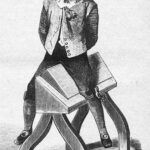2 September 1686: John Reresby describes his organisation of the York garrison
John Reresby. 1875. The Memoirs of Sir John Reresby of Thrybergh, Bart., M.P. for York, etc., 1634-1689. Ed. James J. Cartwright. London: Longmans, Green, and Company. Get it:
.Excerpt
The ten companies consisted of 500 men (besides officers), and the daily guards of 80 men, by detachments of eight out of every company, of four sergeants, six corporals, and one commissioned officer. These met at the place of parade in the minster yard between nine and ten every morning; at ten o’clock they marched off to relieve the several guards, which guards were in all six, viz., the main guard consisting of 32 private sentinels, one drummer, one commissioned officer, one sergeant, one corporal; the other guards were kept at the several gates, which were five: at Bootham Bar there were eight soldiers, one sergeant, one corporal, one drummer; that being next to the Manor the sentries at my door were relieved from thence. At Micklegate Bar there were 12 soldiers, one sergeant, etc. The rest were accordingly distributed to Walmsgate, Castlegate, and Monk Bar. The tattoo was beaten every night by five drums at ten o’clock, at which hour every soldier was to go to his quarters, or be punished if found after that hour in the streets by the patroller that went the round of the streets to see that good order was kept. No soldier was suffered (nor, indeed, citizen) to go out of the gates in the daytime with firearms, dogs, or engines for the destruction of game, except gentlemen or officers, or such as had leave in writing from myself. I did not suffer any quarters to be given without my allowance, and where I found the magistrates did oppress, I relieved as I thought fit, and was impartial in that and all other matters; which surprised a great many, who expected that having it now in my power to oppress my opponents, and to ease my friends, I would have done it; and got me the good opinion of those that had been against me, insomuch as several of them sent to me to desire I would not leave the city, but stay there for their protection; and a gentleman, one Mr Fairfax, that had been my greatest enemy at my election, and upon other accounts, desired me to forgive him and to receive him into friendship upon his knees (a submission which I no way desired).
Comment
Comment
Something to say? Get in touch
Original
The garrison (at York) I formed at that time into this method. The ten companies consisted of 500 men (besides officers), and the daily guards of eighty men, by detachments of eight out of every company, of four sergeants, six corporals, and one commissioned officer. These met at the place of parade in the Minster yard between nine and ten every morning; at ten o’clock they marched off to relieve the several guards, which guards were in all six, viz., the main guard consisting of thirty-two private sentinels, one drummer, one commissioned officer, one sergeant, one corporal; the other guards were kept at the several gates, which were five: at Bootham Bar there were eight soldiers, one sergeant, one corporal, one drummer; that being next to the Manor the sentries at my door were relieved from thence. At Micklegate Bar there were twelve soldiers, one sergeant, etc. The rest were accordingly distributed to Walmsgate, Castlegate, and Monk Bar. The tattoo was beaten every night by five drums at ten o’clock, at which hour every soldier was to go to his quarters, or be punished if found after that hour in the streets by the patroller that went the round of the streets to see that good order was kept. No soldier was suffered (nor, indeed, citizen) to go out of the gates in the day time with firearms, dogs, or engines for the destruction of game, except gentlemen or officers, or such as had leave in writing from myself. I did not suffer any quarters to be given without my allowance, and where I found the magistrates did oppress, I relieved as I thought fit, and was impartial in that and all other matters; which surprised a great many, who expected that having it now in my power to oppress my opponents, and to ease my friends, I would have done it; and got me the good opinion of those that had been against me, insomuch as several of them sent to me to desire I would not leave the city, but stay there for their protection; and a gentleman, one Mr. Fairfax, that had been my greatest enemy at my election, and upon other accounts, desired me to forgive him and to receive him into friendship upon his knees (a submission which I no way desired).
390 words.
Similar
 21 February 1688: On Shrove-Tuesday, cock-throwing York apprentices break a Catholic window, and the militia intervenes, torturing citizens and violating their civic rights
21 February 1688: On Shrove-Tuesday, cock-throwing York apprentices break a Catholic window, and the militia intervenes, torturing citizens and violating their civic rights 16 June 1644: On Trinity Sunday, Parliament and the Scots breach York’s walls and destroy monastic records with a mine next to St Mary’s Tower
16 June 1644: On Trinity Sunday, Parliament and the Scots breach York’s walls and destroy monastic records with a mine next to St Mary’s TowerSearch
Donate
Music & books
Place-People-Play: Childcare (and the Kazookestra) on the Headingley/Weetwood borders next to Meanwood Park.
Music from and about Yorkshire by Leeds's Singing Organ-Grinder.


 Bluesky
Bluesky Extwitter
Extwitter